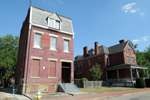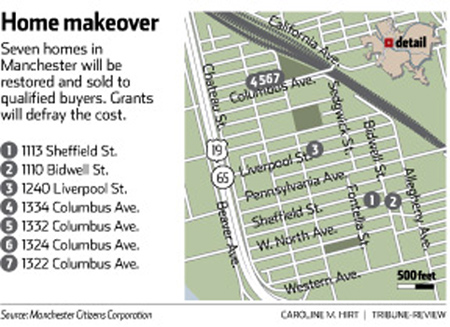
Category Archive: Threatened Historic Resources
-
Restoration of Panther Hollow Makes Huge Progress With $1 Million Grant
Wednesday, September 08, 2010
The Richard King Mellon Foundation recently awarded a $1 million grant to the Pittsburgh Parks Conservancy to create a management plan for Panther Hollow watershed. Panther Hollow, located in Schenley Park, has long been plagued by pollution and invasive species, and the grant will be a huge boost in the effort to restore the important body of water, which once featured a boathouse, and was a popular destination for families.
“We’ll use professionals, and we will bring in consultants to help us create a longterm management plan that will create permanent change,” says Michael Sexauer, director of marketing and membership for the Pittsburgh Parks Conservancy.
The first thing the plan needs to address is educating the public about runoff from the hillsides. “One of our biggest challenges is education of the residents who surround Schenley Park, and pressing on them the importance of being aware of how their lifestyle choices impact Panther Hollow watershed,” says Sexauer.
Another considerable challenge, which the plan will address, is the replacement of harmful invasive species with plants that will bring stability to Panther Hollow’s ecosystem. Additionally, the grant will allow the Parks Conservancy to continue the work they’ve been doing for years, such as installing catch basins and removing debris.
On September 15, the Pittsburgh Parks Conservancy will present “What’s in the Panther Hollow?”, a public meeting to address the problems and solutions. Parks Conservancy staff will provide an overview of the Panther Hollow issues, and guest speaker Michele Adams, principal engineer and founder of Meliora Design, will lecture on the importance of sustainable resources engineering and environmentally sensitive site design.
The event is free, and will be located in Botany Hall, adjacent to Phipps Conservatory. Seating is limited, and attendees should RSVP by September 13 through email, or by calling 412-682-7275.
Sign up to receive Pop City each week.
Source: Michael Sexauer, director of marketing and membership for the Pittsburgh Parks Conservancy
Writer: John Farley -
Part of Beloved Dormont Cinema to be Preserved
By Al Lowe
FOR THE TRIBUNE-REVIEW
Thursday, September 9, 2010History buffs got some good news at the Dormont Council meeting. Although Dormont’s South Hills Theater along West Liberty Avenue has been razed and will be replaced by a CVS store, its memories will live on because of plans to reassemble the theater’s box office and put it in the lobby of the municipal building.
“All I know is that I got a phone call one day at 3:30 p.m. and was told if I wanted the ticket booth, I better have it picked up by 4 p.m.,” said Muriel Moreland, who is president of the Dormont Historical Society. Her late husband, William, was the borough’s mayor for 24 years, until 1989.
Sections of the box office are being kept in her garage, off Espy Avenue.
“I hope they come get it soon because I have to put my lawn furniture there,” she said.
The Dormont municipal building has three rooms set aside for the Historical Society, which recently received a lot of memorabilia from the theater, including two masks denoting comedy and tragedy that once hung in the theater’s lobby. The theater opened in 1928 and closed in 2001, Moreland said.
Council member Joan Hodson said Monday, that, like many others, she and her husband, Jim, used to take their children to the theater. She said her husband will help to reassemble the box office in the lobby.
In other business, council voted 5-2 to pass a resolution in response to the Keystone Oaks School District’s proposal to close schools.
The resolution, written by Councilman John Maggio, states that council supports neighborhood schools and renews a willingness to collaborate with the district on planning efforts.
Heather Schmidt and Laurie Malkin cast the opposing votes.
They said they had no problems with the resolution, except for its timing. They thought that council should consider passing the resolution after a task force studying the district’s plans makes its recommendation.
Keystone Oaks is considering closing two kindergarten-through-fifth-grade elementary schools, Myrtle in Castle Shannon and Aiken in Green Tree, and converting Dormont Elementary from a K-5 school to a K-3 school for students from all three boroughs. The current middle school would be used for grades four through six, and the current high school would house grades seven through 12; grades seven eight would be kept apart from grades nine through 12.
-
Denis Theatre in Mt. Lebanon Won’t Be Silent Screen Too Long
By Rick Wills
PITTSBURGH TRIBUNE-REVIEW
Thursday, September 2, 2010A group working to renovate and reopen the Denis Theatre in Mt. Lebanon signed a sales agreement Wednesday to buy the building.
The Denis Theatre Foundation agreed to pay $668,750 for the theater on Washington Road. The theater, which opened 72 years ago, closed in 2004.
The deal should be final within 60 days, said Anne Kemerer, the foundation’s executive director.
“This is almost like an unattainable dream, especially after the economy got bad and fundraising became so difficult,” Kemerer said. “To me, a main street has a theater on it.”
The foundation has raised $663,000 and aims to raise another $1.8 million for the first phase of the renovation, which includes opening one screen, updating or replacing basic systems and installing an elevator.
The Encore, the first of three planned screening rooms, is expected to open in 2012.
The project’s second phase includes opening two more screens, restoring a stage in one theater and adding meeting rooms.
So far, the foundation has received 436 donations — the two largest are $155,000 from an anonymous benefactor and $100,000 from The Pittsburgh Foundation.
“The goal of this project is to serve a wide demographic over the South Hills. There is something about a community theater that makes a community stronger,” said Mark Lynch, a spokesman for the foundation.
The Denis opened in 1938.
“I remember standing in line to see ‘Benji’ there. The Denis Theatre is an historic building that holds lots of nostalgia for people in the area,” said Jennifer Smokelin, a foundation board member and Mt. Lebanon resident.
-
Work on Former Hollow Tavern Progressing
By Jewels Phraner
LIGONIER ECHO
Thursday, September 2, 2010
Fred Haeflein works on reviving the Hollow Tavern on Route 30 outside of Ligonier. Jared Wickerham | Tribune-Review
Saving Sleepy Hollow hasn’t gone exactly the way owner Fred Haeflein expected.
He’s had a skilled crew at work rebuilding the log landmark, but now he’s looking for a good chef and manager to operate the restaurant.
After an arson destroyed the building in February 2008, causing so much damage that Unity code enforcement officer Merle Musick condemned the property, Haeflein bought it with the intention of restoring it.
Financial troubles plagued the project early on, and this summer Haeflein said he has struggled to find the right person to run the restaurant. Although he has fond childhood memories of the restaurant, he has no interest in running the facility once it’s finished.
“I don’t cook. I’m not a restaurant manager,” Haeflein said. “I build things. I save things. I just want this building here.
“I need a good restaurateur – no, I need a great restaurateur – to keep this place running for a long time,” he said.
When the project ran into financial problems in early 2007, The Progress Fund, a Greensburg-based nonprofit lending organization approached Haeflein about a loan.
“That valley is so great. So many people enjoy driving through it. And we thought it would be a nice venue for people to stop and enjoy the valley,” said David Kahley, chief executive officer for the organization, which focuses on tourism-oriented projects.
Project loan officer Bob Patter said that while people might not see progress as they drive by the building, that doesn’t mean work isn’t being done behind the scenes.
“It’s still a very active project,” he said. “Fred is moving forward with it. Perhaps not at the pace everyone would like to see, but he’s trying to find the right person to run the restaurant for him.”
Haeflein said he expected to buy exterior logs for the building. But he wasn’t able to find the correct size and had to custom-make them instead.
“I wanted them to be as close to the original (Sleepy Hollow) as possible, and you just can’t buy logs that width anymore,” he said.
So Haeflein spent part of the summer using an ancient mill in his New York shop to cut logs, then transporting them to Ligonier.
“This is probably a lot like how the original logs were made,” he said. “It’s a pure miracle that (the mill) actually worked. That mill is probably as old as this building and hasn’t been used in 20 years.”
For now, only a few logs are secured to the building, but Haeflein said he will be back to finish the job soon.
Kelly’s Sleepy Hollow LLC was formed by Haeflein and his brother, Rich, who have been restoring the landmark west of Ligonier for about two years.
Edgar Wiltrout of Ligonier is serving a 10- to 28-year prison sentence for torching the restaurant and tavern on Feb. 23, 2008, because the former owner owed Wiltrout $1,000 and fired his girlfriend as a cook.
-
7 Homebuyers Sold on Manchester Vision
By Adam Brandolph
PITTSBURGH TRIBUNE-REVIEW
Thursday, September 2, 2010
Linda Nelson, chairwoman of the Manchester Citizens Corporation, inspects one of the properties being restored on Columbus Avenue in Manchester. The home was purchased as part of the Great House Sale. Jasmine Goldband | Tribune-Review
For the first time in years, Anthony Clark sees a reason to invest in his North Side neighborhood.
“Manchester is really starting to get going, and after 15 years of renting, I think it’s a good time,” said Clark, 44. “I think we’re about to see some really great things.”
For years, the city demolished vacant homes in Manchester, turning usable buildings into weed-filled lots that became overrun with graffiti and trash. The vacant lots made selling homes difficult, and people living there say the community suffered despite the fact that police records show the number of crimes fell by nearly half over the past decade.
“When you have a tooth out, the disease begins to spread,” said Linda Nelson, chairwoman of the Manchester Citizens Corporation, a community group founded in 1965 that helped spur more than $40 million in developments and initiatives. “If (buildings) come out, it’s definitely a hindrance. If we can renovate them, it’s a plus.”

An abandoned structure (left) on the 1100 block of Bidwell Street in Manchester is one of several slated for rehabilitation. Jasmine Goldband | Tribune-Review
With the group’s managing director Stanley Lowe urging the city to save buildings from demolition, the wrecking ball slowed. Along with the Pittsburgh History & Landmarks Foundation, it identified 110 buildings that should be saved, 63 of which are considered a priority.
Lowe said he reminded members of the city’s Historic Review Commission about the neighborhood’s rich architectural and cultural heritage, which helped Manchester achieve city and national historic status in 1979.
“Once you tear down the building, you can never go back,” Lowe said.
In October, the citizens’ group showcased seven homes to be restored by March. More than 100 people, some from as far away as Venezuela and Colombia, attended a two-day session that included a seminar educating them about how to buy one of the homes.
Twenty-five people put down $1,500 deposits, and seven qualified buyers were chosen at random to buy the homes. The rest were put on a waiting list for future restorations.
“The homes were a terrible mess,” Nelson said. “But the people who came in saw our vision.”
The cost to restore each home will range from $150,000 and $450,000, but they will sell for $90,000 to $200,000.
Incentives totaling $2 million for the buyers will be paid by grants from the city’s Urban Redevelopment Authority, the federal Department of Housing and Urban Development, Allegheny County, the Pittsburgh History & Landmarks Foundation’s Landmarks Community Capital Corporation and the Allegheny Foundation.
City Councilman R. Daniel Lavelle, whose district includes Manchester, said the strategy “fits the city’s economic reality.”
“The city can’t afford to do it all at once, so (the citizens’ group has) identified key properties they want to save,” Lavelle said. “I think it’s a tremendous project.”
Preserving the “architectural fabric” of the historic district has been ongoing since the 1970s, said Arthur Ziegler, president of the landmarks foundation.
Rob Stephany, executive director of the redevelopment authority, said the restorations are a “really bright strategy,” especially because they’re near construction at Columbus Square, a $15 million, 31-home development on four acres.
“Manchester has everything working for it,” he said.
-
Challenge Grant Generates $100,000 for Historic Religious Properties Program
PHLF News
Wednesday, August 04, 2010Thanks to $25,000 in challenge grants from two anonymous donors, The Pittsburgh History and Landmarks Foundation is reviving its recently troubled Historic Religious Properties Program, which provides matching grants to help congregations perform exterior maintenance on their facilities.
“Since 1997, we’ve been giving an average of 70 to 80 thousand dollars a year in grants. When we hit economic hard times in 2010, we suspended the grant program, because there just wasn’t enough money,” says Carole Malakoff, coordinator for the religious properties program.
With the grant program in limbo, two donors stepped up three weeks ago, giving the foundation 60 days to match the grants. The foundation’s President put up $12,500, and over 288 donors contributed gifts totaling $62,710, bringing the total grant package available for the 2011 grant cycle to over $100,210, making this the most successful annual appeal in the Pittsburgh History and Landmark Foundation’s 46 year history.
Applications for grants will be due by December 1, 2010, and provide matching grants up to $10,000 to Allegheny County churches that are over 50 years old.
“Over the years, the majority of our grants have gone to stained glass window work, roof and gutter repair, and masonry work,” says Malakoff.
As a result of the generous outpouring of support, PHLF has decided to host a technical assistance workshop on September 20 at the Calvary Episcopal Church in Shadyside. Experts will provide demonstrations to members of congregations on green building, handicap accessibility, and all that it entails to maintain a historic building.
“We sent out a letter in June to see if there was enough interest, and we’ve had 30 congregations call to say they are interested. So, we’ve had a wonderful response, and we’re still accepting people to come,” says Malakoff.
The workshops go from 10:30 a.m. to two p.m. Interested parties can contact Carole Malakoff at 412-321-3612.
Sign up to receive Pop City each week.
Source: Carole Malakoff, coordinator for PHLF Religious Properties Program
Writer: John Farley -
Historical Groups Left in Lurch by Funding Cuts
By Richard Robbins, Pittsburgh TRIBUNE-REVIEW
Sunday, July 25, 2010
Museum inn keeper and Curator Jim Koontz, of Ligonier, builds a birdhouse that is being modeled after the Laughlintown museum's cook house. Barry Reeger/Tribune-Review
Just two years ago, Soldiers & Sailors Memorial Hall & Museum, the Oakland landmark honoring veterans of all of America’s wars, was on the receiving end of a nice piece of change from Pennsylvania: $260,000.
In 2009, the state’s largesse shrank dramatically, to a mere $30,000.
This year, Soldiers & Sailors is in line to get nothing, a result of a state budget that eliminated grants for historical sites, from the 218-acre Bushy Run Battlefield in Penn Township to the smallest local historical society.
The funding cuts will have a huge impact on groups devoted to local history, according to Ronald Gancas, Soldiers & Sailors president and CEO.
He foresees severe retrenchments, including the continuation of a wage freeze in effect at Soldiers & Sailors since 2007 and the need to recruit and mobilize even more volunteers. The museum’s education department has gone from five full-time and two part-time employees a few years ago to one full-time and one part-time employee today.
“If this trend continues, it will take 50 years to put things back together,” Gancas said.
The 2009 state budget contained $1.7 million for regional and local history, a sum that the state House added after several months in which it appeared there would be no funding for historical groups.
But this time around, there was no late change to rescue local history grants, either for general operations or special projects.
There was lip-service support for public history from members of the General Assembly but nothing more, said Deborah Filipi, executive director of the Pennsylvania Federation of Museums and Historical Organizations.
“We are in a crisis, there is no doubt about it,” Filipi said. “There are some museums that are already hurting. I suspect some of these are not going to survive.”
Jeremy Burnworth, president of the Fayette County Historical Society, said the funding cuts could not come at a worse time for his group, which conducted a ribbon-cutting ceremony Friday at its new museum and headquarters in a renovated 1700s building.
“This is really bad timing,” Burnworth said, adding that the historical society will be “held back without” the state dollars. He was counting on $10,000 from the state and a $10,000 match from the county to help staff the museum and the Searight Tollhouse, both along the National Road.
“We were on track” for the funding, Burnworth said. Now the game plan is to utilize volunteers in place of paid staff.
Tina Yandrick, director of operations for the Ligonier Valley Historical Society, said the expiration of funding meant elimination of summer internships cutting general maintenance “over and above the usual.”
Yandrick noted Compass Inn, a restored Laughlintown stagecoach stop built in 1799, “always” needs refurbishing.
Nevertheless, she said, “we are fortunate we have Compass Inn,” a money-maker for the society that helps to offset the loss of state money.
State funding was “always important money for us,” said Lisa C. Hays, executive director of the Westmoreland County Historical Society, adding that money has been so scarce, “I’m trying to get through this month.”
“We’ve already tightened our belts a lot,” Hays said. She forecast the potential for shorter business hours beginning in 2011 to “save staff time.” However, because the society likely will make a greater effort to raise private dollars, Hays was uncertain if savings are actually possible.
-
Group Asks 1-Year Delay in Mellon Arena Demolition
Thursday, July 15, 2010By Mark Belko, Pittsburgh Post-GazetteA group seeking to save Mellon Arena today urged its owner to delay a proposed demolition for one year.
Rob Pfaffmann, a Downtown architect who leads Reuse the Igloo, asked the city-Allegheny County Sports & Exhibition Authority board to give the group a year to develop an economically viable plan to save the Igloo. The SEA owns the building.
“We do not want to see a white elephant,” he said.
Mr. Pfaffmann said the group also would develop a plan to help the SEA cover the operating costs of the building while a more thorough planning process is undertaken and alternatives are studied.
“We should not rush to judgment on this if we have an economic circumstance that doesn’t demand it,” he said.
Mr. Pfaffmann was among about 10 people to speak at the SEA meeting today in favor of saving the building.
“There’s no do over. Once it’s gone, it’s gone and it will never be back again,” said Nancy Motz Cosnotti. “If the Civic Arena is gone, then part of Pittsburgh will be gone and I don’t want that.”
Reuse the Igloo also would like to see the SEA open the arena’s distinctive dome as a demonstration to see if it still works and to determine the cost of operating it.
SEA Executive Director Mary Conturo said no vote has been scheduled yet on a demolition, favored by the Penguins, Mayor Luke Ravenstahl and county Executive Dan Onorato.
She said the SEA is still in the process of reviewing options through an ongoing historic review process.
Asked whether the SEA would agree to a one-year delay, board chairman Wayne Fontana said the request would be taken under advisement.
“I’m not adverse to anything at this point,” he said.

